Note: The Global Indicators Database is no longer available. Trends included in the Database is available on our Tools & Resources page. If you need help locating data or trends, contact us at info@pewresearch.org with any questions.
Pew Research Center’s Global Indicators Database holds roughly 20 years and more than 600,000 interviews worth of data on public opinion and attitudes from more than 60 publics around the world. The database contains information ranging from views of global powers like the United States and China, the world economy, ratings of world leaders and more. Results can be filtered and explored in several ways: by topic, survey year, region or country. The database is updated each year with the latest data and additional indicators. Access the newly updated Global Indicators Database now.
With new 2022 survey results just around the corner, here are five of the many insights from the newly added data available on the database.
This blog post serves as an introduction to Pew Research Center’s Global Indicators Database. All statistics cited in this analysis are drawn from the database itself. The database is based on over 600,000 interviews the Center has conducted in 69 countries since 2002. Read more about the methodology of our international surveys.
Favorable views of the U.S. president rebounded dramatically in 2021
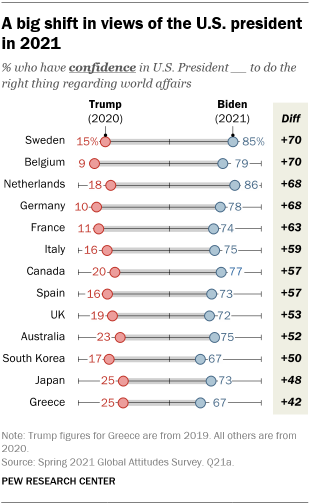
Last year saw a major shift in the global image of American leadership after the election of Joe Biden as president. Majorities in each of the 16 publics surveyed expressed confidence in Biden. In all countries where there is a recent trend available, there was an increase of at least 40 percentage points in confidence in the U.S. president after Biden took office. In Western Europe, ratings for the U.S. president were at their highest since Barack Obama was in office.
Similar jumps in confidence occurred after the election of Obama in 2008, according to the Center’s historical data. In spring 2008, George Bush’s last year in office, just 14% of Germans expressed confidence in the U.S. president. This jumped to a record high of 93% during Obama’s first year in office.
Confidence in Putin and Xi is consistently low, while other world leaders garner largely positive ratings
With the Russian invasion of Ukraine in the news, the Global Indicators Database allows users to look back at historical confidence in Russian President Vladimir Putin. In France, Germany, Spain and the United Kingdom, confidence ratings for Putin were at their highest in 2003 and reached their lowest in 2012-2015. In the U.S., confidence in Putin again reached a record low in 2021, with only 16% saying they had confidence in Putin to do the right thing regarding global affairs. (Only 16% had said the same in 2014 as well.) Greece is a notable exception to this downward trend, with confidence in Putin reaching a record high of 55% in 2021.
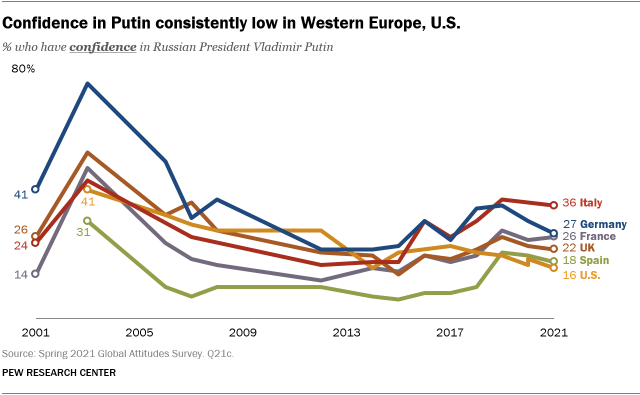
Confidence in Chinese President Xi Jinping has also been consistently low in many countries since the question was first asked. Confidence in Xi reached record lows in 2021 in many countries for which trend data is available. In 2021, only 15% in South Korea expressed confidence in Xi, down from the 25% who said the same in 2019.
In her last year in office, German Chancellor Angela Merkel performed well, consistent with the largely positive ratings across her 16-year tenure. While French President Emmanuel Macron garnered less confidence than Biden or Merkel, he still saw relatively high support globally.
Global views of the U.S. consistently more favorable than views of China
Since the Center began tracking international views of the U.S. and China in 2002, the former has often garnered more favorable ratings in most places surveyed. The most recently available data shows U.S. favorability higher than Chinese favorability in 16 of the 17 surveyed publics.
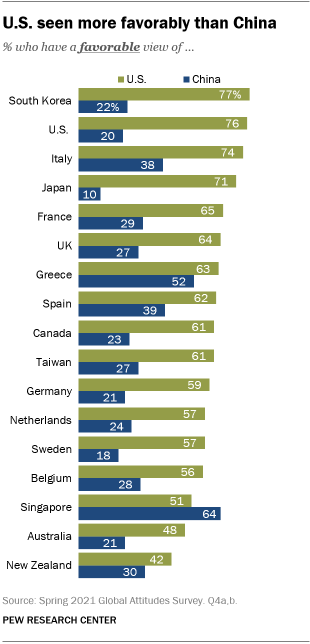
In 2021, favorable views of the U.S. ranged from 42% in New Zealand to 77% in South Korea. Meanwhile, a low of 10% in Japan saw China favorably, while 64% in Singapore said the same. In 2020, when U.S. favorability was at a 20-year low in several of the surveyed publics, positive ratings remained level with or higher than those of China in each of the 13 publics surveyed.
In recent years, both Chinese and U.S. ratings have seen significant changes. From 2019 to 2020, favorable views of China stayed roughly the same or decreased in all places surveyed in both years. As for the U.S., after historically low ratings across several publics in 2020, the share of people with favorable views increased significantly in 2021 in all publics where the question was asked in both years.
In some publics, sharp rise in the share of people saying the U.S. respects personal freedoms, the opposite for China
Pew Research Center surveys have also documented a recent increase across many publics in the belief that the U.S. government respects its people’s individual liberties. Between 2013 and 2018, there was a steady decline in the share who said that of the U.S., reaching its low point at the end of that period, roughly halfway through Trump’s presidency. But in Canada and across Europe, the share who says the U.S. government respects personal liberties significantly increased from 2018 to 2021; half or more in each of these publics surveyed said this last year.
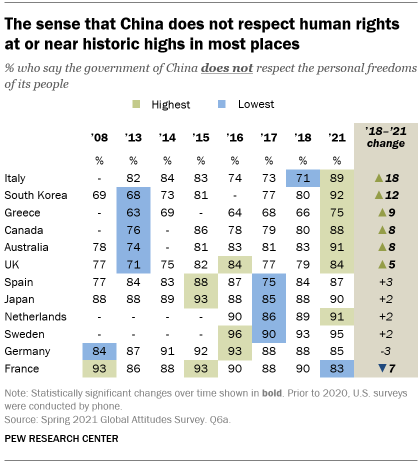
In the same period, increasing shares in some places said the Chinese government does not respect its people’s personal freedoms. This view was at or near historic highs in most publics surveyed, having risen significantly in Italy, South Korea, Greece, Australia, Canada and the UK. Nine-in-ten or more in Sweden, South Korea, Australia, the Netherlands and Japan said Beijing does not respect individual liberties.
Views of NATO, the EU and the UN mostly positive among publics surveyed
In 2021, prior to the Russian invasion of Ukraine, NATO received largely positive ratings from member states surveyed. Roughly two-thirds or more in Italy, the Netherlands, Canada and the UK viewed NATO favorably, while roughly half or more in nearly all of the additional member nations surveyed agreed. Among non-NATO publics where the question is asked, Swedes have also consistently held favorable views toward the organization.
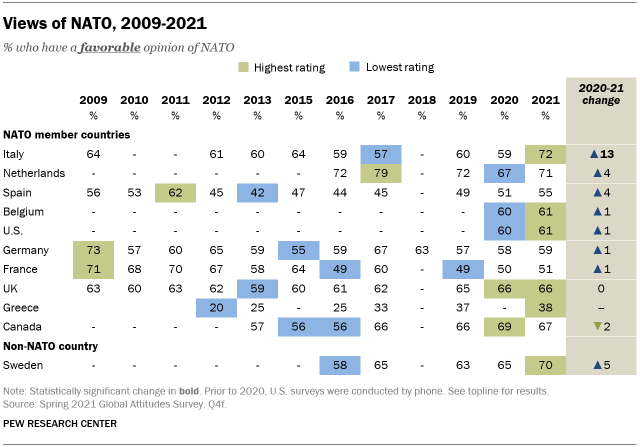
In recent years, the European Union enjoyed high favorability ratings from both member and non-member publics surveyed. In 2021, 78% of Koreans said they have a very or somewhat favorable opinion of the EU. Majorities in all EU countries surveyed except for Greece (49%) said the same.
The United Nations garnered similarly high public ratings, with roughly six-in-ten or more holding positive views in 14 of the 17 publics surveyed in 2021. Historical trends also show consistently positive attitudes toward the body in most countries for which data is available.

